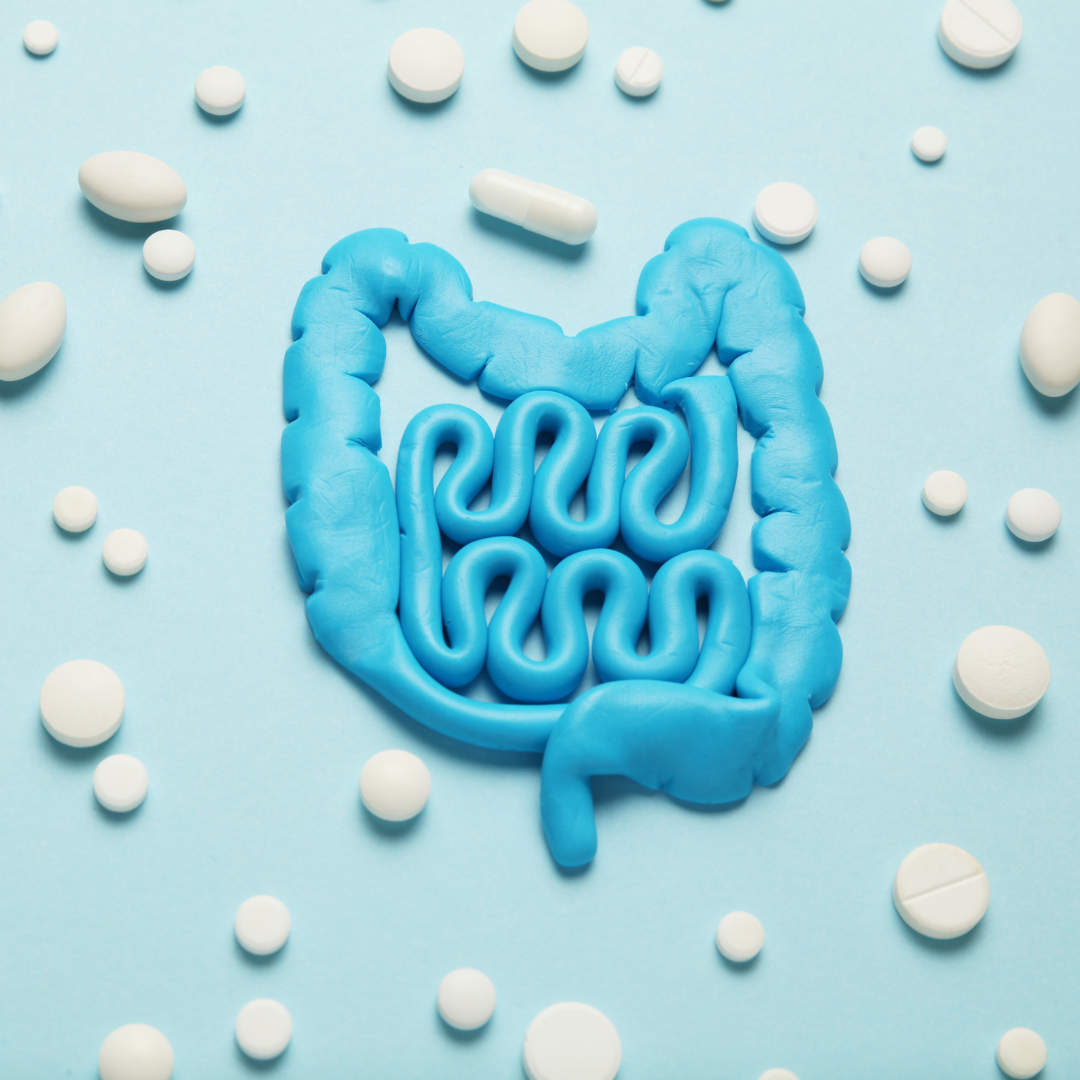
The impact of antibiotic use on intestinal dysbiosis: keys to caring for your microbiota
The gut microbiota is a complex ecosystem composed of trillions of microorganisms, including bacteria, viruses, fungi, and protozoa. These tiny inhabitants of the gastrointestinal tract play a crucial role in our health, influencing digestion, the immune system, neurotransmitter production, and regulating inflammation. However, the indiscriminate overuse of antibiotics can disrupt this delicate balance, triggering a condition known as gut dysbiosis .
The Importance of the Gut Microbiota
The gut microbiota is crucial for overall health , as it is involved in a variety of bodily processes. It helps break down fiber and complex carbohydrates , producing short-chain fatty acids (SCFAs) , which nourish colon cells and have anti-inflammatory effects , promoting a healthy gut environment .
It also influences the metabolism of drugs and other substances , as certain microorganisms are capable of breaking down these compounds, altering their effectiveness and potentially causing side effects . The microbiota is key to maintaining the integrity of the intestinal barrier , protecting the body from toxins while facilitating the absorption of nutrients .
Additionally, it modulates the immune system by teaching immune cells to differentiate between pathogens and benign substances , helping to prevent autoimmune disorders . Finally, the gut-brain axis demonstrates how microbiota can affect mental health , influencing neuroinflammation and neurotransmitter production , which is linked to disorders such as anxiety and depression .
It is estimated that between 500 and 1,000 species of microorganisms reside in the human gut , highlighting the diversity and complexity of this system. An imbalance in this bacterial flora can lead to a range of health problems.
What is intestinal dysbiosis?
Gut dysbiosis is a term that refers to an imbalance in the gut microbiota . This imbalance occurs when there is a change in the composition of microorganisms in the gut, with an increase in pathogenic bacteria and a decrease in beneficial bacteria. Dysbiosis can be caused by several factors, including antibiotic use.
This imbalance can affect various aspects of health, from the digestive system to the immune system and mental health . In the gut, dysbiosis can lead to symptoms such as bloating , bowel pain , diarrhea , or constipation , and is associated with conditions such as irritable bowel syndrome (IBS) and inflammatory bowel disease (IBD).
Furthermore, dysbiosis can also contribute to the development of autoimmune disorders , as the immune system is disrupted by the bacterial imbalance, reducing its ability to distinguish between pathogens and harmless substances . In terms of mental health, dysbiosis has been linked to disorders such as anxiety , depression , and other neurological problems, due to the influence that the microbiota exerts on the gut-brain axis .
Antibiotics and their effects on the microbiota
The use of antibiotics, especially broad-spectrum antibiotics , can disrupt the balance of the gut microbiota and promote the growth of harmful bacteria and pathogens . Some of the pathogens that can thrive due to this imbalance include:
- Clostridioides difficile : This is one of the most common pathogens that can develop after the use of antibiotics, especially broad-spectrum ones, and is responsible for serious intestinal infections.
- Escherichia coli : Although E. coli is a common bacterium found in the gut, certain pathogenic serotypes, such as Shiga toxin-producing E. coli (STEC), can overgrow following antibiotic use. These strains can cause serious infections, such as bloody diarrhea and hemolytic uremic syndrome .
- Vancomycin-resistant enterococci (VRE) : Prolonged antibiotic use may promote the growth of drug- resistant enterococci , such as vancomycin , making them difficult to treat and potentially leading to serious nosocomial infections, particularly in hospitalized patients.
- Methicillin-resistant Staphylococcus aureus (MRSA) : Overuse of antibiotics can promote the growth of MRSA , which is resistant to many antibiotics, including those in the penicillin family. This pathogen can cause skin, lung, and blood infections, some of which are very difficult to treat.
- Candida albicans : Antibiotics, especially broad-spectrum antibiotics, can upset the balance of bacteria and fungi in the gut, promoting the growth of Candida albicans , a fungus normally found in the body in small amounts. Candida overgrowth can lead to yeast infections, such as intestinal thrush .
What don't we mean by broad-spectrum antibiotics?
Broad-spectrum antibiotics are effective against a wide variety of bacteria , both gram-positive and gram-negative. These antibiotics are commonly used when the specific pathogen has not been identified, or when serious infections caused by multiple types of bacteria need to be treated. Some examples of broad-spectrum antibiotics include amoxicillin , an antibiotic in the penicillin class, which is effective against many gram-positive and gram-negative bacteria. Ciprofloxacin , on the other hand, belongs to the fluoroquinolone class and works against a variety of bacteria, including some resistant bacteria. Tetracycline is used to treat general infections.
Clindamycin , used against gram-positive and anaerobic bacteria. Cephalexin , commonly used for skin and respiratory infections. Piperacillin -tazobactam , a combination of antibiotics, is commonly prescribed for a wide range of gram-positive and gram-negative bacteria, including some resistant strains.
These antibiotics are widely used in conventional medicine, but their indiscriminate use can have side effects, such as alteration of the intestinal microbiota and the selection of resistant bacteria.
How to prevent and treat dysbiosis after antibiotic use
Fortunately, there are several strategies we can implement to restore and maintain a healthy balance of gut microbiota after antibiotic treatment.
a. Nutrition and foods that promote a healthy microbiota
A diet rich in fiber and fermented foods is essential for nourishing the beneficial bacteria in your gut. Foods like yogurt , kefir , kimchi , and sauerkraut are excellent sources of probiotics that can help replenish your gut microbiota with beneficial microorganisms. Additionally, including fiber-rich foods like fruits , vegetables , legumes , and resistant starches provides food for your gut bacteria and promotes the production of short-chain fatty acids , which have anti-inflammatory effects.
b. Use of probiotics and prebiotics
Probiotics play a key role in restoring the balance of intestinal flora after use. Probiotics are live microorganisms that, when consumed in the right amounts, can benefit intestinal health by helping to restore microbial diversity.
One of the most effective probiotics for restoring the gut microbiota is Lactobacillus rhamnosus . This microorganism has been shown to be effective in preventing and treating antibiotic-associated diarrhea by restoring gut flora and preventing the overgrowth of pathogens such as Clostridium difficile . Furthermore, Lactobacillus rhamnosus promotes the production of lactic acid, which creates an acidic environment that inhibits the growth of unwanted bacteria.
Another highly recommended probiotic is Saccharomyces boulardii , a probiotic yeast that has been shown to be effective in restoring intestinal balance after antibiotic use. Saccharomyces boulardii helps prevent antibiotic-induced diarrhea and promotes gut microbiota recovery by promoting bacterial diversity while inhibiting the growth of intestinal pathogens.
Bifidobacterium bifidum is another important probiotic, especially beneficial for older adults, who tend to experience a decrease in bacterial diversity. This probiotic helps restore the intestinal barrier, reduces inflammation, and improves digestion, which is particularly important after a course of antibiotics.
Lactobacillus plantarum is known for its ability to balance the gut microbiota, promoting a healthy digestive tract environment and reducing inflammation. This probiotic also helps digest carbohydrates, which can alleviate common digestive issues, such as bloating and intestinal discomfort, common after taking antibiotics.
In addition to these, a combination of diverse probiotic strains, such as Lactobacillus acidophilus , Bifidobacterium lactis , and Streptococcus thermophilus , may provide a broader range of benefits, helping to restore bacterial diversity and boost immune function.
It's important to keep in mind that the effectiveness of probiotics depends on several factors, including the specific strain used, the dosage, and the duration of treatment. Therefore, it's recommended to consult a healthcare professional to determine which probiotics are best suited to each person's individual needs.
On the other hand, prebiotics , such as inulin and fructans , promote the growth of beneficial bacteria, improving intestinal health and promoting the production of short-chain fatty acids that have anti-inflammatory effects.
Conclusion
The use of antibiotics, although necessary to fight infections, can have a significant impact on the health of our gut microbiota. The resulting gut dysbiosis can trigger a range of health disorders, from digestive problems to neurological conditions. However, with a comprehensive approach that includes proper nutrition , the use of probiotics and prebiotics , and a healthy lifestyle, it is possible to restore microbial balance and protect gut health long-term. Caring for our microbiota not only benefits our digestion but also our overall health, immune system, and emotional well-being.
FOUNTAIN
Lathakumari, R.H., Vajravelu, L.K., Satheesan, A., Ravi, S., & Thulukanam, J. (n.d.). Antibiotics and the gut microbiome: understanding their impact on human health .
Patangia, D.V., Ryan, C.A., Dempsey, E., Ross, R.P., & Stanton, C. (2020). Impact of antibiotics on the human microbiome and consequences for host health . MicrobiologyOpen, 9(5), e1260.
Socała, K., Doboszewska, U., Szopa, A., Serefko, A., Wlodarczyk, M., Zielińska, A., Poleszak, E., Fichna, J., & Wlaź, P. (nd). The role of the microbiota-gut-brain axis in neuropsychiatric and neurological disorders .
Wu, HJ, & Wu, E. (nd). The role of the gut microbiota in immune homeostasis and autoimmunity .
